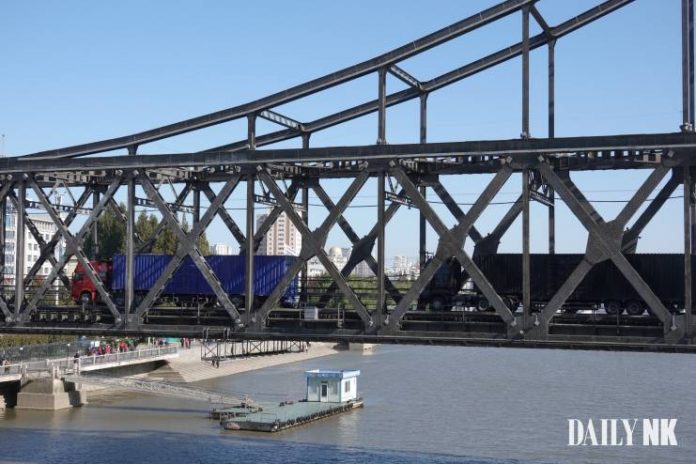
Exchange rates are on the rise in North Korea’s markets. The trend is related to the government’s new “20×10 regional development policy,” which has revived import activities by allowing greater autonomy in the trade sector.
On Mar. 17, Daily NK’s regular market survey recorded the KPW-RMB exchange rate in Hyesan at 1,380 KPW to the yuan.
In July 2023, the KPW-RMB exchange rate in Hyesan jumped to KPW 1,410 as local traders anticipated the resumption of trade, but as the state continued to dominate trade, the exchange rate dropped to KPW 1,200 and remained there for seven months.
In mid-February, however, the exchange rate suddenly rose to KPW 1,400 and now appears to be stabilizing in the mid to high KPW 1,300 range.
The same survey on Mar. 17 found the Chinese yuan trading at 1,370 RMB in Sinuiju, North Pyongan Province. Similar to Hyesan, the exchange rate was lower in early February (KPW 1,200) and rose to KPW 1,380 in mid-February, after which the rate has remained stable for the past month.
The KPW-USD exchange rate has continued to creep higher. On Mar. 17, the U.S. dollar was recorded at KPW 8,500 to the dollar in Pyongyang. The dollar had been fluctuating between KPW 8,200 and 8,400 since last December before rising and remaining at KPW 8,500 in February.
The same survey showed that the dollar in Sinuiju was trading at KPW 8,570. Compared to the exchange rate recorded two weeks ago (Mar. 4, KPW 8,470), the exchange rate has risen 1.1%.
Among the regions surveyed, the highest exchange rate was recorded in the border city of Hyesan at KPW 8,600 to the dollar. This high marks the first time the KPW-USD exchange rate has reached KPW 8,600 since North Korea sealed its borders in January 2020.
Government gives traders greater autonomy
The sustained rise in the exchange rate since February appears to be due to the increased autonomy granted to regional traders under Kim Jong Un’s “20×10 regional development policy.”
In January, Kim Jong Un addressed the 10th session of the 14th Supreme People’s Assembly, stating that “at present, the gap between the capital and the provinces and the imbalances among regions are key issues that must be resolved to improve the people’s lives.” Kim then unveiled his “20×10 regional development” plan to significantly raise basic living standards over the next decade by building rural factories in 20 counties each year.
“Each region is competing to build factories as [implementation of] the 20×10 policy begins,” a source inside North Korea told Daily NK. “The authorities have given the provinces quite a bit of autonomy to conduct trade independently in order to modernize their factories quickly.”
Even last year, the emphasis on state-led trade meant that cross-border trade activities for provincial enterprises and smaller trading units were strictly controlled. However, since the implementation of the 20×10 policy, the trading environment has changed to the point where even small trading units are generally allowed to trade as long as they have a government-issued waku (business license), the source said.
In addition, the authorities have often turned a blind eye to private smugglers “borrowing” waku from official trading enterprises and importing smuggled goods under the guise of importing construction materials for rural factories.
The source also reported that smuggling activities by private individuals in border areas such as North Hamgyong Province and Yanggang Province have increased under the guise of imports for regional factory construction. As a result, imports of machinery and other construction materials have risen to some extent.
“Looking at before and after the regional development policy [was announced], the atmosphere in the trade [sector] has changed a lot,” the source said. “I think we’re seeing the highest levels of smuggling ever since the outbreak of COVID-19.”
However, with the eyes of the international community on Sinuiju, the regime continues to maintain tight control over smuggling flowing through the city.
Translated by David Black. Edited by Robert Lauler.
Daily NK works with a network of sources living in North Korea, China, and elsewhere. Their identities remain anonymous for security reasons. For more information about Daily NK’s network of reporting partners and information-gathering activities, please visit our FAQ page here.
Please send any comments or questions about this article to dailynkenglish@uni-media.net.


















